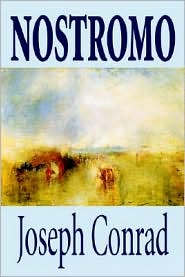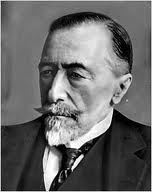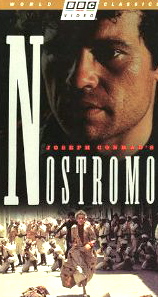“Costaguana will always be run by butchers and tyrants.”
Often regard ed as Conrad’s masterwork, Nostromo, written in 1904, is also Conrad’s darkest novel, filled with betrayals at all levels and offering little hope for man’s redemption. A novel of huge scope and political intrigue, it is also a novel in which no character actually wins. All must accept the ironies which fate has dealt them.
ed as Conrad’s masterwork, Nostromo, written in 1904, is also Conrad’s darkest novel, filled with betrayals at all levels and offering little hope for man’s redemption. A novel of huge scope and political intrigue, it is also a novel in which no character actually wins. All must accept the ironies which fate has dealt them.
Setting the novel in the imaginary South American country of Costaguana, the story centers around a silver mine in the mountains outside of the capital, Sulaco, vividly depicting its allure and the price each character pays for its success.
When Charles Gould, returns from England to claim and reopen the rich silver mine he has inherited from his father, he has good intentions– to provide jobs for the peasants and contribute to the economy of the town at the same time that he also profits. Soon, however, he becomes obsessed with wealth and power, and as the political climate gets hotter, he must pay off government officials, bandits, the church, and various armed revolutionaries to be able to work.

Each of these groups is vividly depicted as working for its own ends and not for the good of the people, and with their goals focused on the real world, these characters have no self-awareness, nor do they develop it during the novel.
In contrast to these “unrealized” humans, Conrad presents several characters who develop some self-awareness through their experiences. Nostromo, a local legend, is a man of principle who has always kept his word. Martin Decoud, a newspaper man, is a nihilist who has editorialized against the revolution, though he has yet to test himself. Dr. Monygham, captured during a past revolution, broke under torture, and is now seeking absolution by fighting against this revolution. And the good and long-suffering wife of Charles Gould, Dona Emilia, who has lost her husband to his silver mine, now devotes her life to helping others.
 When Nostromo agrees to protect a load of silver from revolutionaries by taking it out to sea, he takes Decoud with him, leaving him on an island with the silver when they almost sink. Decoud’s reaction to his isolation, and Nostromo’s reaction to the treasure that is suddenly “his,” provide a dark commentary on idealism and human nature.
When Nostromo agrees to protect a load of silver from revolutionaries by taking it out to sea, he takes Decoud with him, leaving him on an island with the silver when they almost sink. Decoud’s reaction to his isolation, and Nostromo’s reaction to the treasure that is suddenly “his,” provide a dark commentary on idealism and human nature.
In the conclusion, which includes a love story that feels tacked on, Conrad’s darkest self is revealed, offering little hope of change and even less hope for man’s redemption. Rich in atmosphere, vibrant in description, filled with characters representing all walks of life and philosophy, and set in a country where revolution is a way of life, the novel is full of dark portents and bleak political outcomes.
Notes: A very good BBC production of this novel is available.
